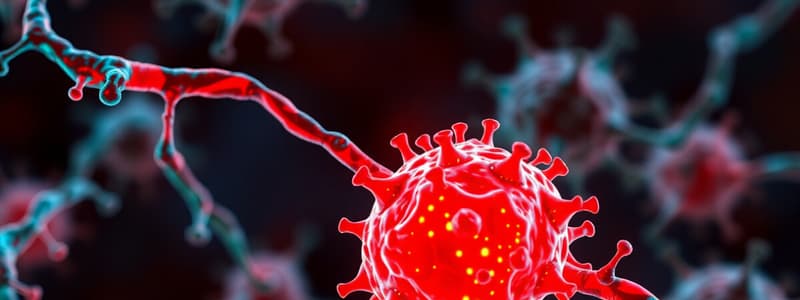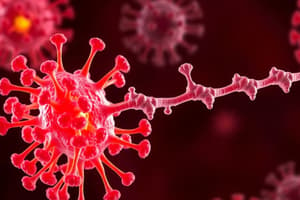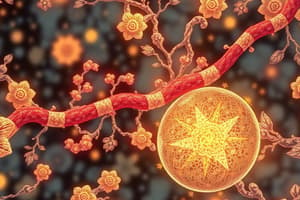Podcast
Questions and Answers
What is the primary function of IP3 in cellular signaling?
What is the primary function of IP3 in cellular signaling?
- Bind to lipids in the plasma membrane
- Transcribe DNA in the nucleus
- Release Ca2+ from the endoplasmic reticulum (correct)
- Activate protein kinase C in the cytosol
How does DAG contribute to cellular signaling?
How does DAG contribute to cellular signaling?
- By activating protein kinase C (correct)
- By activating smooth muscle contraction
- By binding to the IP3 receptor
- By releasing Ca2+ from the nucleus
Which domain of the IP3 receptor is responsible for binding IP3?
Which domain of the IP3 receptor is responsible for binding IP3?
- Cytosolic domain
- Transmembrane domain
- IP3 binding domain (correct)
- Carboxyl terminus domain
What cellular response can be initiated by the IP3 signaling pathway?
What cellular response can be initiated by the IP3 signaling pathway?
What is a common characteristic of both IP3 and DAG in cellular signaling?
What is a common characteristic of both IP3 and DAG in cellular signaling?
How do hormones typically reach target cells in the body?
How do hormones typically reach target cells in the body?
What role do gap junctions play in cell signaling?
What role do gap junctions play in cell signaling?
What is the primary function of growth hormone (GH) in the body?
What is the primary function of growth hormone (GH) in the body?
Which of the following statements about intracellular mediators is true?
Which of the following statements about intracellular mediators is true?
What defines signal transduction in cells?
What defines signal transduction in cells?
What is a consequence of signaling through complementary protein binding on cell surfaces?
What is a consequence of signaling through complementary protein binding on cell surfaces?
Which type of signaling is most prevalent in plants for cell communication?
Which type of signaling is most prevalent in plants for cell communication?
Which of the following elements cannot pass directly through gap junctions?
Which of the following elements cannot pass directly through gap junctions?
What term describes the series of reactions activated by kinases in signal transduction pathways?
What term describes the series of reactions activated by kinases in signal transduction pathways?
Which kinase is directly activated by the binding of growth factor ligands to their receptors?
Which kinase is directly activated by the binding of growth factor ligands to their receptors?
Which of the following statements about proto-oncogenes is true?
Which of the following statements about proto-oncogenes is true?
What is the main function of the ERK in the MAPK signaling pathway?
What is the main function of the ERK in the MAPK signaling pathway?
Which of the following accurately describes MEK's role in the MAPK cascade?
Which of the following accurately describes MEK's role in the MAPK cascade?
What type of molecule, apart from proteins, may participate in signal transduction pathways?
What type of molecule, apart from proteins, may participate in signal transduction pathways?
How do growth factors influence the activity of the receptors in the MAPK pathway?
How do growth factors influence the activity of the receptors in the MAPK pathway?
What is the relationship between the genes encoding Raf and c-Myc?
What is the relationship between the genes encoding Raf and c-Myc?
What is the primary role of a ligand in cell signaling?
What is the primary role of a ligand in cell signaling?
Which type of cell has the ability to respond to a specific chemical signal?
Which type of cell has the ability to respond to a specific chemical signal?
What happens when a ligand binds to its receptor?
What happens when a ligand binds to its receptor?
What is the ultimate goal of the signaling cascade triggered by ligand-receptor binding?
What is the ultimate goal of the signaling cascade triggered by ligand-receptor binding?
Which statement is true regarding nontarget cells?
Which statement is true regarding nontarget cells?
Which phrase best describes how signals are communicated between cells in a multicellular organism?
Which phrase best describes how signals are communicated between cells in a multicellular organism?
In which scenario would a cell NOT respond to a signaling molecule?
In which scenario would a cell NOT respond to a signaling molecule?
How is the information from an intercellular signal converted within a target cell?
How is the information from an intercellular signal converted within a target cell?
What are second messengers primarily responsible for in cellular signaling?
What are second messengers primarily responsible for in cellular signaling?
Why do cells maintain low concentrations of calcium ions (Ca2+) in the cytosol?
Why do cells maintain low concentrations of calcium ions (Ca2+) in the cytosol?
Which enzyme is responsible for converting ATP into cyclic AMP (cAMP)?
Which enzyme is responsible for converting ATP into cyclic AMP (cAMP)?
What is a primary effect of calcium ion (Ca2+) signaling in β-cells of the pancreas?
What is a primary effect of calcium ion (Ca2+) signaling in β-cells of the pancreas?
How does cyclic AMP (cAMP) typically influence cellular responses?
How does cyclic AMP (cAMP) typically influence cellular responses?
The removal of which two components from ATP during cAMP synthesis is a key step in the signaling pathway?
The removal of which two components from ATP during cAMP synthesis is a key step in the signaling pathway?
How does a spike in cytoplasmic Ca2+ levels alter protein behavior?
How does a spike in cytoplasmic Ca2+ levels alter protein behavior?
What distinguishes cAMP signaling responses in different cell types?
What distinguishes cAMP signaling responses in different cell types?
Flashcards are hidden until you start studying
Study Notes
Cell Membrane Signaling Systems
- Cells use chemical signals to communicate.
- A sending cell secretes a ligand that binds to a receptor on a target cell.
- Nontarget cells lack the specific receptor for the ligand.
- The binding of a ligand to its receptor triggers a signaling cascade inside the target cell.
- This cascade ultimately leads to a cellular response, such as gene activation or cell division.
- The original intercellular signal is transformed into an intracellular signal.
- Endocrine signaling involves a cell targeting a distant cell through the bloodstream.
Signaling Through Cell-Cell Contact
- Gap junctions (in animals) and plasmodesmata (in plants) directly connect neighboring cells.
- These channels allow small signaling molecules (intracellular mediators) to pass between cells.
- This allows groups of cells to coordinate their response to a signal.
- Cells can also bind to each other through complementary proteins on their surfaces.
- This interaction can change the shape of the proteins, transmitting a signal.
Signal Transduction
- Signal transduction is the cellular response to an external stimulus.
- Ligand binding to receptors on the plasma membrane often activates kinase domains within the cell.
- Kinase cascades occur when kinases activate a series of reactions similar to a waterfall.
- A well-known example is the MAPK (mitogen-activated protein kinase) pathway, which is activated by growth factor signaling.
- Growth factor receptors act as kinases, triggering a cascade that ultimately promotes cell growth and division.
- The MAPK cascade involves Raf, MEK, and ERK kinases.
- Proto-oncogenes are genes encoding proteins involved in cell division, and their overactivation can lead to cancer.
Second Messengers
- Second messengers are small, non-protein molecules that relay signals initiated by ligand binding.
- Examples include Ca2+ ions, cyclic AMP (cAMP), and inositol phosphates.
Calcium Ions
- The concentration of Ca2+ in the cytosol is low, and it is actively pumped out of the cell.
- Ca2+ is often stored in compartments like the endoplasmic reticulum.
- In some signaling pathways, ligand binding opens ligand-gated calcium ion channels, allowing Ca2+ to flow into the cytoplasm, increasing its concentration.
- Ca2+ binds to specific proteins, altering their shape and activity.
- This can lead to different cellular responses depending on the cell type, such as insulin release or muscle contraction.
Cyclic AMP (cAMP)
- Adenylyl cyclase converts ATP to cAMP, removing two phosphates and forming a ring structure.
- cAMP activates protein kinase A (PKA), which phosphorylates target proteins to pass along the signal.
- PKA has different target proteins in different cell types, leading to diverse cellular responses.
IP3
- Inositol triphosphate (IP3) is produced from phospholipids.
- IP3 can rapidly diffuse into the cytosol and bind to IP3 receptors, which open to release Ca2+ from the endoplasmic reticulum.
- This allows for signal transduction from the plasma membrane to the intracellular calcium stores.
- IP3 signaling, along with Ca2+, plays a role in diverse cellular processes, including smooth muscle contraction and enzyme secretion.
Diacylglycerol (DAG)
- Diacylglycerol (DAG) stays in the plasma membrane and activates protein kinase C (PKC).
- PKC then phosphorylates its own targets.
- DAG signaling is involved in the activation of enzymes, ultimately leading to processes like DNA transcription.
Studying That Suits You
Use AI to generate personalized quizzes and flashcards to suit your learning preferences.



